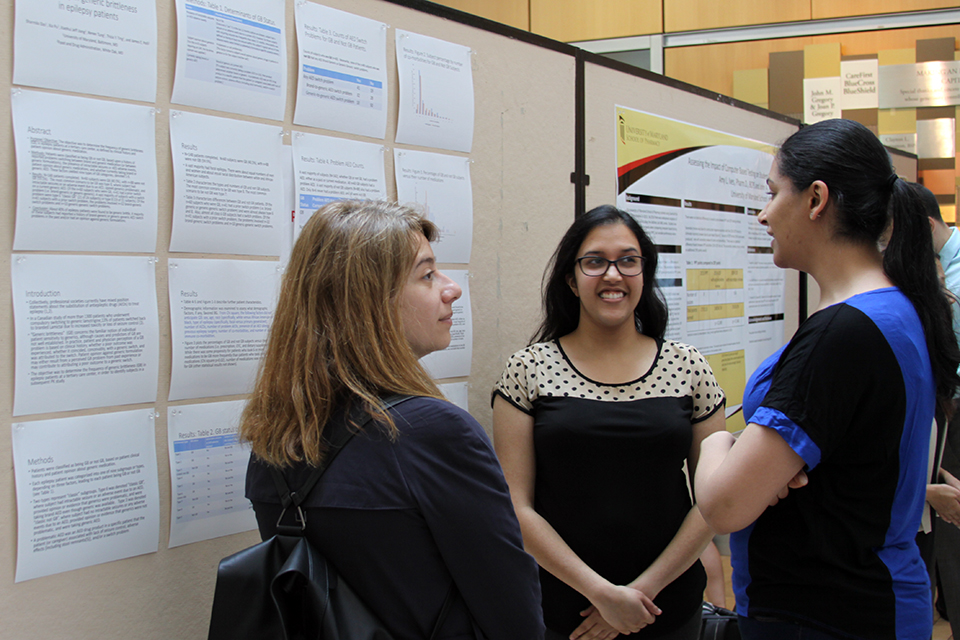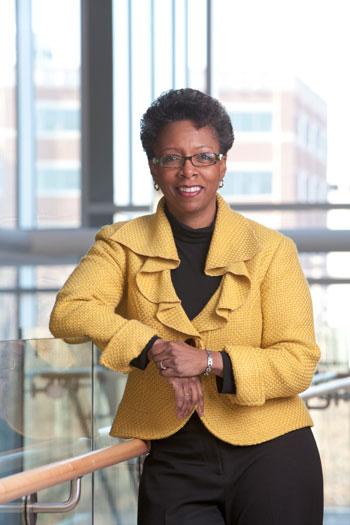Dean Eddington Presents 2012 State of the School Address
Annual address highlights education, practice, research, and outreach accomplishments.
By Malissa Carroll
December 18, 2012
Dean Natalie D. Eddington, PhD, FAAPS, FCP, delivered her annual State of the School of Pharmacy Address on Dec. 7 to a lecture hall filled with faculty, staff, students, alumni, preceptors, and University of Maryland officials.
“The foundation of what we do at the School is based on our mission to lead pharmacy education, scientific discovery, patient care, and community engagement in the state of Maryland and beyond,” she said. “The annual State of the School of Pharmacy Address provides an opportunity for us to reflect on what we have accomplished over the last year, and aspire to continue or enhance those accomplishments in the years to come.”
In the area of education, the School has 645 Doctor of Pharmacy (PharmD) students. Applications to the School’s PharmD program in 2012 totaled 982, which is comparable to the number of applications the School has received over the past four years. The School admits approximately 160 students to the program each year. Of those admitted to the Class of 2016, 86 percent entered with at least one college degree.
Of the 160 PharmD students who graduated in May, 51 percent chose jobs in community pharmacies, and 35 percent chose pharmacy residencies. “We have noted the challenges encountered by Doctor of Pharmacy graduates in the current job market. To help our students compete in the changing market, we have launched a Job Ready Program that addresses topics such as interviewing, CV and resume writing, and networking,” Eddington said.
The School’s graduate programs in its Departments of Pharmaceutical Sciences (PSC) and Pharmaceutical Health Services Research (PHSR) enrolled a combined 79 students. Graduates of these programs go on to careers in academia, the pharmaceutical industry, and with the government.
Established in August 2012, the new Master of Science in Pharmaceutical Sciences (Pharmacometrics) program has enrolled 26 students. This program, developed to provide students with the knowledge and skills needed to plan, perform, and interpret pharmacometric analyses and influence key drug development, regulatory, and therapeutic decisions, is designed for professionals with full- or part-time jobs. All courses are held online. A Master of Regulatory Science program will launch in early 2013. It will also be available exclusively online.
The residency and fellowship training program continues to thrive in the School’s Department of Pharmacy Practice and Science (PPS), Eddington reported. New to this program is a residency that focuses on health system and pharmacy administration. With many health systems now requiring graduates to complete residency training before applying for available positions, it is expected that this particular residency will grow in popularity within the coming years.
In the area of practice, faculty in PPS provided clinical care in 45 settings, delivered more than 21,000 hours of patient care, and received more than $7.8 million in externally funded grants and contracts. Other activities in the department focused on the establishment of the Center for Translational Medicine, led by Joga Gobburu, PhD, MBA, FCP, that focuses on using qualitative modeling to develop tools to help design better research methods and better research outcomes associated with drug development and clinical research, and the continued growth of the Center for Innovative Pharmacy Solutions, which is currently working to develop an online platform to educate pharmacists to meet ongoing health care demands.
In research, the School continued its mission to intensify nationally and internationally recognized programs in drug discovery and development, health services, practice-based, and translational research. PHSR faculty garnered $3.3 million in research grants and contracts, and PSC brought in $6.8 million. The School’s total for research awards received in Fiscal Year 2012 was $18 million, with $4.9 million of that funding coming from the NIH.
In PHSR, Linda Simoni-Wastila, PhD, is leading a University-wide effort to bring together individuals interested in comparative effectiveness research. Her group meets to coordinate research ideas and strategies, and has submitted several grant and award proposals to a number of organizations. Under the leadership of Bruce Stuart, PhD, professor of pharmaceutical health services research, the Peter Lamy Center for Drug Therapy and Aging received eight new grants that totaled $1.1 million, which will be used to support 14 graduate students and three post-doctoral fellows in the Center. For his research concerning how to engage hard to reach patients, C. Daniel Mullins, PhD, professor of pharmacoeconomics, was awarded a grant from the Patient-Centered Outcomes Research Institute (PCORI). The School of Pharmacy was part of a prestigious group of organizations that received funding from the Institute. Other organizations that received funding included the Mayo Clinic, Oregon Health Sciences, Duke University, and the University of Illinois at Chicago.
Other PHSR faculty members who received notable grant awards during Fiscal Year 2012 included Ilene Zuckerman, PharmD, PhD, professor and chair of PHSR, and Susan dosReis, PhD, associate professor in PHSR. Zuckerman received a two-year grant from the National Institute of Aging to help fund her work on long-term anticoagulation therapy after traumatic brain injury (TBI) in older adults. The results of her work will support the creation of evidence-based guidelines for improving the management of TBI in older adults, particularly those who require anticoagulation. dosReis received a two-year grant from the National Institute of Mental Health for her work measuring parent preferences for attention deficit hyperactivity disorder (ADHD) treatment to predict adherence. Her study seeks to understand caregivers’ most valued preferences for the treatment of ADHD in their child to determine if this preference, along with caregiver and physician concordance, can predict adherence to treatment for the child’s disorder.
In PSC, assistant professor Yan Shu, PhD, received a $1.5 million grant from the National Institute of General Medical Sciences for his work on xenobiotic transporter regulator and IRIP function. This study will determine whether IRIP, a protein that aids the regulation of transporter activity in the body, plays a critical role in the disposition and response of drugs, such as the top prescribed anti-diabetic medication Metformin.
Also in PSC, assistant professor Amanda Ogelsby-Sherrouse, PhD, and Angela Wilks, PhD, professor and vice chair of research for the department, received grants for their work with heme utilization and regulation. Heme is a chemical compound that is found in the body’s red blood cells. Ogelsby-Sherrouse received aK22 Career Transition Award from the NIH for her work focusing on how the bacterium P. aeruginosa, responds to environmental conditions, including low concentrations of heme. Her work will help support the development of new treatments for infectious disease in the future. Wilks received a $1.7 million grant from that National Institute of Allergy and Infectious Diseases for her work to further explain how the mechanism of extracellular heme utilization and regulation relates to virulence.
With outreach and community service a priority for the School of Pharmacy, the Maryland Poison Center continued to fill a strong need in the state. Celebrating its 40th anniversary in 2012, the Center, based in PPS, has received approximately two million calls since it was established in 1972. The Center has recently fielded calls concerning the inappropriate use of bath salts, synthetic marijuana, and mercury in skin lightening creams. “The Maryland Poison Center has served a vital role in our state for the past 40 years. The Center remains engaged with citizens and provides a great public health service,” Eddington said.
A highlight of the year included students from the School’s Doctor of Pharmacy program receiving the Target Market Award for their participation in the Script Your Future Challenge hosted by the American Association of Colleges of Pharmacy and the National Association of Chain Drug Stores. This challenge provided students with the opportunity to go into the community and talk to patients about adhering to their medication regimens. The Target Market Award indicates that students from the School of Pharmacy received the highest number of pledges from their work in community settings, health system settings, and health fairs. “This award is a testament to our students’ commitment to reaching out and informing the public about what it is a pharmacist does and the impact that a pharmacist can have on their health care,” Eddington said.



